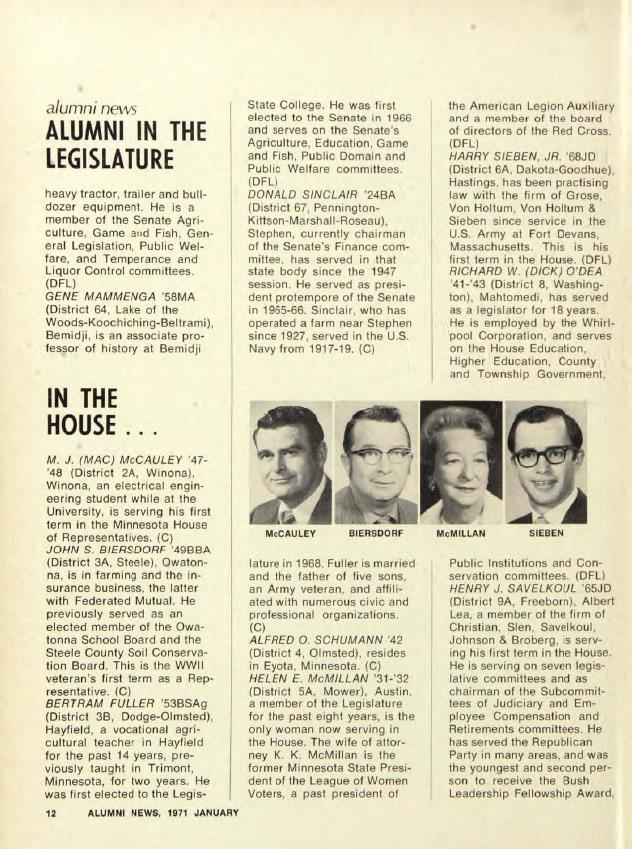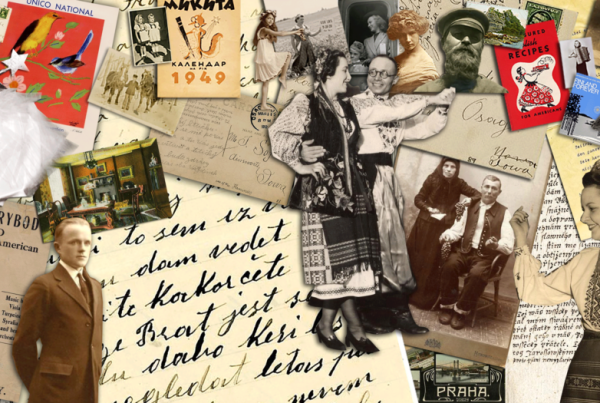By Hannah O’Neill
Welcome back to U of M Radio on Your Historic Dial! The podcast has returned in time for Women’s History Month. The KUOM archive is full of interviews, lectures, and stories featuring dynamic, history-making women. Today, we will focus on a program featuring Minnesota Legislature Representative Helen McMillan, on the state of women’s rights in 1971.
You can listen to the episode here in the browser and read the script below.
Podcast (umnradio): Play in new window | Download
Episode 7: Women’s Rights in ‘71
You are listening to U of M Radio on Your Historic Dial podcast and this is episode 7: Women’s Rights in ‘71.
Hello! This is Hannah, taking over from Karen as the KUOM project archivist at the University of Minnesota Archives.
March is Women’s History Month, and today we’re going to listen in on a discussion on women’s rights from nearly 50 years ago. In 1971, Helen McMillan, who attended, but did not graduate from, the University of Minnesota, was the only woman sitting in the Minnesota State Legislature, serving as a representative from 1963 to 1974. She was a guest on the show featured in today’s podcast, Legislature ‘71, which was a weekly discussion program focused on the “problems and possibilities facing the 1971 Minnesota Legislature.” Other topics covered by the program included human rights, Indian Affairs, transportation, housing, and environmental issues. On the show today, we will first hear Rep. McMillan discuss her singular status with Senator Rollin Glewwe and Diana Murphy of the League of Women Voters.

“Alumni in the Legislature,” in the University of Minnesota Alumni magazine, 1971. Available at http://hdl.handle.net/11299/52485
The moderator notes that the program is for the first and probably only time balanced between the sexes, citing McMillan’s position as the sole female legislator. McMillan responds that she can’t figure out why the numbers are so low, pointing out that women have served in the legislature since the passage of the Suffrage Amendment in 1919. She states that what is harder to understand is why fewer women run, as there is nothing that can legally stop them. She speculates that women have higher standards and assume they need to be more qualified than most men are before they can run. Senator Glewwe adds that he believes women don’t run because their husbands won’t let them, noting that his own career has caused his family life to suffer and it the family would likely suffer more from a wife and mother’s absence.
Next, the panelists discuss the expansion of an anti-discrimination law, most likely the Minnesota Human Rights Act, which passed in 1973, and protected women from discrimination in employment, housing, public services and several other areas.
Also passed after the recording of this program, was the Equal Rights Amendment, a piece of legislation intended to constitutionally guarantee equal rights regardless of gender. A controversial bill since its’ inception, some argued that the amendment would actually hurt women as it could potentially erase legislation specifically designed to help them.
The Equal Rights Amendment was ratified in Minnesota in 1973, and Rep. McMillan was quoted as saying she felt that “the battle is finally won.”* Ultimately, though, the amendment was three states short of the 38 necessary to ratify a federal amendment.
The episode continues with examples of the ways women can be professionally short-changed, from not receiving equal pay to not being promoted as frequently or as highly as men with comparable experience. Regarding a question on whether or not there is legislation to prevent this, Senator Glewwe points out that legislators can pass laws, but they count on administrators to enact them.
Listening to this discussion, it’s clear that many of the conversations we are having now regarding discrimination, and women’s rights in particular, began decades ago, and have never really been resolved. Almost 50 years after this program was recorded, issues like the undervaluation of women’s knowledge and labor, reproductive rights, and affordable childcare, are still at the forefront of many political and social debates.
The 1971-1972 legislative session was the only one in which Rep. McMillan stood as the lone female legislator. Perhaps by appearing on this program, she inspired other women to run; in the immediately subsequent sessions, there were six women serving, then eight, then 13, then 20; the numbers increased every year until 2009. Today, there are 65 women serving in the Minnesota Legislature.
That’s all we have for this episode! Tune in next month when we celebrate Earth Day with conservation-themed programs. Thanks for listening!
The U of M Radio on Your Historic Dial Podcast is produced every other week for your enjoyment. Subscribe or download on iTunes or GooglePlay so you don’t miss another moment of historic Minnesota radio.
If you enjoy our clips and want to hear or learn more, go to www.lib.umn.edu/uarchives and search KUOM in the collections guides.
Digitization of University Archives recordings was financed in part with funds provided by the State of Minnesota from the Arts and Cultural Heritage Fund through the Minnesota Historical Society.
*quote taken from Winona Daily News, Jan 22, 1973, p. 5
—Hannah O’Neill is a project archivist for the University of Minnesota Archives. To learn more about the University of Minnesota Archives, please visit www.lib.umn.edu/uarchives.



